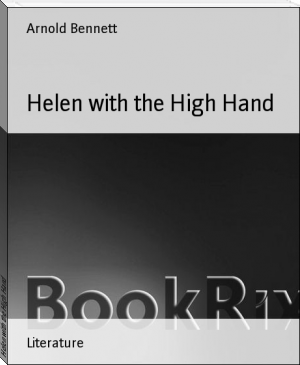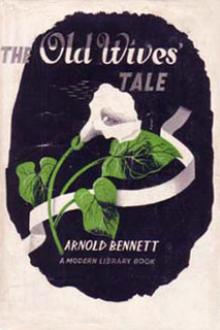Helen with the High Hand - Arnold Bennett (debian ebook reader .txt) 📗

- Author: Arnold Bennett
Book online «Helen with the High Hand - Arnold Bennett (debian ebook reader .txt) 📗». Author Arnold Bennett
The clock finished her remark.
"No, miss, it's not cooked," said Mrs. Butt. "To tell ye the honest truth, miss, I've been learning, 'stead o' cooking this 'ere kidney." She picked up the kidney in her pudding-like hand and gazed at it. "I'm glad the brasses is clean, miss, at any rate, though the house _does_ look as though there was no woman about the place, and servants _are_ silly. I'm thankful to Heaven as the brasses is clean. Come into my scullery, and welcome."
She ceased, still holding up the kidney.
"H'm!"--from Uncle James.
This repeated remark of his seemed to rouse the fury in her. "You may 'h'm,' Mester Ollerenshaw," she glared at him. "You may 'h'm' as much as yo'n a mind." Then to Helen: "Come in, miss; come in. Don't be afraid of servants." And finally, with a striking instinct for theatrical effect: "But I go out!"
She flung the innocent and yielding kidney to the floor, snatched up a bonnet, cast off her apron, and departed.
"There!" said James Ollerenshaw. "You've done it!"
CHAPTER VII
THE NEW COOK
Ten minutes later Mr. James Ollerenshaw stood alone in his kitchen-sitting-room. And he gazed at the door between the kitchen-sitting-room and the scullery. This door was shut; that is to say, it was nearly shut. He had been turned out of the scullery; not with violence--or, rather, with a sort of sweet violence that he liked, and that had never before been administered to him by any human soul. An afternoon highly adventurous--an afternoon on which he had permitted himself to be insulted, with worse than impunity to the insulter, by the childish daughter of that chit Susan--an afternoon on which he had raised his hat to Mrs. Prockter--a Saturday afternoon on which he had foregone, on account of a woman, his customary match at bowls--this afternoon was drawing to a close in a manner which piled thrilling event on thrilling event.
Mrs. Butt had departed. For unnumbered years Mrs. Butt had miscooked his meals. The little house was almost inconceivable without Mrs. Butt. And Mrs. Butt had departed. Already he missed her as one misses an ancient and supersensitive corn--if the simile may be permitted to one; it is a simile not quite nice, but, then, Mrs. Butt was not quite nice either. The fault was not hers; she was born so.
The dropping of the kidney with a _plop_, by Mrs. Butt, on the hard, unsympathetic floor of the scullery, had constituted an extremely dramatic moment in three lives. Certainly Mrs. Butt possessed a wondrous instinct for theatrical effect. Helen, on the contrary, seemed to possess none. She had advanced nonchalantly towards the kidney, and delicately picked it up between finger and thumb, and turned it over, and then put it on a plate.
"That's a veal kidney," she had observed.
"Art sure it isn't a sheep's kidney, lass?" James had asked, carefully imitating Helen's nonchalance.
"Yes," she had said. "I gather you are not passionately fond of kidneys, great-stepuncle?" she had asked.
"I was once. What art going to do, lass?"
"I'm going to get our tea," she had said.
At the words, _our_ tea, the antique James Ollerenshaw, who had never thought to have such a sensation again, was most distinctly conscious of an agreeable, somewhat disturbing sensation of being tickled in the small of his back.
"Well," he had asked her, "what can I do?"
"You can go out," she had replied. "Wouldn't it be a good thing for you to go out for a walk? Tea will be ready at half-past four."
"I go for no walk," he said, positively....
"Yes, that's all right," she had murmured, but not in response to his flat refusal to obey her. She had been opening the double cupboard and the five drawers which constituted the receptacles of the scullery-larders; she had been spying out the riches and the poverty of the establishment. Then she had turned to him, and, instead of engaging him in battle, she had just smiled at him, and said: "Very well. As you wish. But do go into the front room, at any rate."
And there he was in the middle room, the kitchen, listening to her movements behind the door. He heard the running of water, and then the mild explosion of lighting the second ring of the gas-stove; the first had been lighted by Mrs. Butt. Then he heard nothing whatever for years, and when he looked at the clock it was fourteen minutes past four. In the act of looking at the clock, his eye had to traverse the region of the sofa. On the sofa were one parasol and two gloves. Astonishing, singular, disconcerting, how those articles--which, after all, bore no kind of resemblance to any style of furniture or hangings--seemed, nevertheless, to refurnish the room, to give the room an air of being thickly inhabited which it never had before!
Then she burst into the kitchen unexpectedly, with a swish of silk that was like the retreat of waves down the shingle of some Atlantic shore.
"My dear uncle," she protested, "please do make yourself scarce. You are in my way, and I'm very busy."
She went to the cupboard and snatched at some plates, two of which she dropped on the table, and three of which she took into the kitchen.
"Have ye got all as ye want?" he questioned her politely, anxious to be of assistance.
"Everything!" she answered, positively, and with just the least hint of an intention to crush him.
"Have ye indeed!"
He did not utter this exclamation aloud; but with it he applied balm to his secret breast. For he still remembered, being an old man, her crushing him in the park, and the peril of another crushing roused the male in him. And it was with a sardonic and cruel satisfaction that he applied such balm to his secret breast. The truth was, he knew that she had not got all she wanted. He knew that, despite her extraordinary capableness (of which she was rather vain), despite her ability to calculate mentally the interest on eighty-nine pounds for six months at four-and-a-half per cent., she could not possibly prepare the tea without coming to him and confessing to him that she had been mistaken, and that she had _not_ got everything she wanted. She would be compelled to humble herself before him--were it ever so little. He was a hard old man, and the prospect of this humbling gave him pleasure (I regret to say).
You cannot have tea without tea-leaves; and James Ollerenshaw kept the tea-leaves in a tea-caddy, locked, in his front room. He had an extravagant taste in tea. He fancied China tea; and he fancied China tea that cost five shillings a pound. He was the last person to leave China tea at five shillings a pound to the economic prudence of a Mrs. Butt. Every day Mrs. Butt brought to him the teapot (warmed) and a teaspoon, and he unlocked the tea-caddy, dispensed the right quantity of tea, and relocked the tea-caddy.
There was no other tea in the house. So with a merry heart the callous fellow (shamefully delighting in the imminent downfall of a fellow-creature--and that a woman!) went into the front room as he had been bidden. On one of the family of chairs, in a corner, was a black octagonal case. He opened this case, which was not locked, and drew from it a concertina, all inlaid with mother-of-pearl. Then he went to the desk, and from under a pile of rent books he extracted several pieces of music, and selected one. This selected piece he reared up on the mantelpiece against two brass candlesticks. It was obvious, from the certainty and ease of his movements, that he had the habit of lodging pieces of music against those two brass candlesticks. The music bore the illustrious name of George Frederick Handel.
Then he put on a pair of spectacles which were lying on the mantelpiece, and balanced them on the end of his nose. Finally he adjusted his little hands to the straps of the concertina. You might imagine that he would instantly dissolve into melody. Not at all. He glanced at the page of music first through his spectacles, and then, bending forward his head, _over_ his spectacles. Then he put down the concertina, gingerly, on a chair, and moved the music half-an-inch (perhaps five-eighths) to the left. He resumed the concertina, and was on the very point of song, when he put down the concertina for the second time, and moved the tassel of his Turkish cap from the neighbourhood of his left ear to the neighbourhood of his right ear. Then, with a cough, he resumed the concertina once more, and embarked upon the interpretation of Handel.
It was the Hallelujah Chorus.
Any surprise which the musical reader may feel on hearing that James Ollerenshaw was equal to performing the Hallelujah Chorus on a concertina (even one inlaid with mother-of-pearl) argues on the part of that reader an imperfect acquaintance with the Five Towns. In the Five Towns there are (among piano scorners) two musical instruments, the concertina and the cornet. And the Five Towns would like to see the composer clever enough to compose a piece of music that cannot be arranged for either of these instruments. It is conceivable that Beethoven imagined, when he wrote the last movement of the C Minor Symphony, that he had produced a work which it would be impossible to arrange for cornet solo. But if he did he imagined a vain thing. In the Five Towns, where the taste for classical music is highly developed, the C Minor Symphony on a single cornet is as common as "Robin Adair" on a full brass band.
James Ollerenshaw played the Hallelujah Chorus with much feeling and expression. He understood the Hallelujah Chorus to its profoundest depths; which was not surprising in view of the fact that he had been playing it regularly since before Helen was born. (The unfading charm of classical music is that you never tire of it.)
Nevertheless, the grandeur of his interpretation of the Hallelujah Chorus appeared to produce no effect whatever in the scullery; neither alarm nor ecstasy! And presently, in the midst of a brief pianissimo passage, James's sensitive ear caught the distant sound of chopping, which quite marred the soft tenderness at which he had been aiming. He stopped abruptly. The sound of chopping intrigued his curiosity. What could she be chopping? He advanced cautiously to the doorway; he had left the door open. The other door--between the kitchen and the scullery--which had previously been closed, was now open, so that he could see from the front room into the scullery. His eager, inquisitive glance noted a plate of beautiful bread and butter on the tea-table in the kitchen.
She was chopping the kidney. Utterly absorbed in her task, she had no suspicion that she was being overlooked. After the chopping of the kidney, James witnessed a series of operations the key to whose significance he could not find.
She put a flat pan over the gas, and then took it off again. Then she picked up an egg, broke it into a coffee-cup, and instantly poured it out of the coffee-cup into a basin. She did the same to another egg, and yet another. Four eggs! The entire household stock of eggs! It was terrible! Four eggs and a kidney among two people! He could not divine what she was at.
Then she got some butter on the end of





Comments (0)